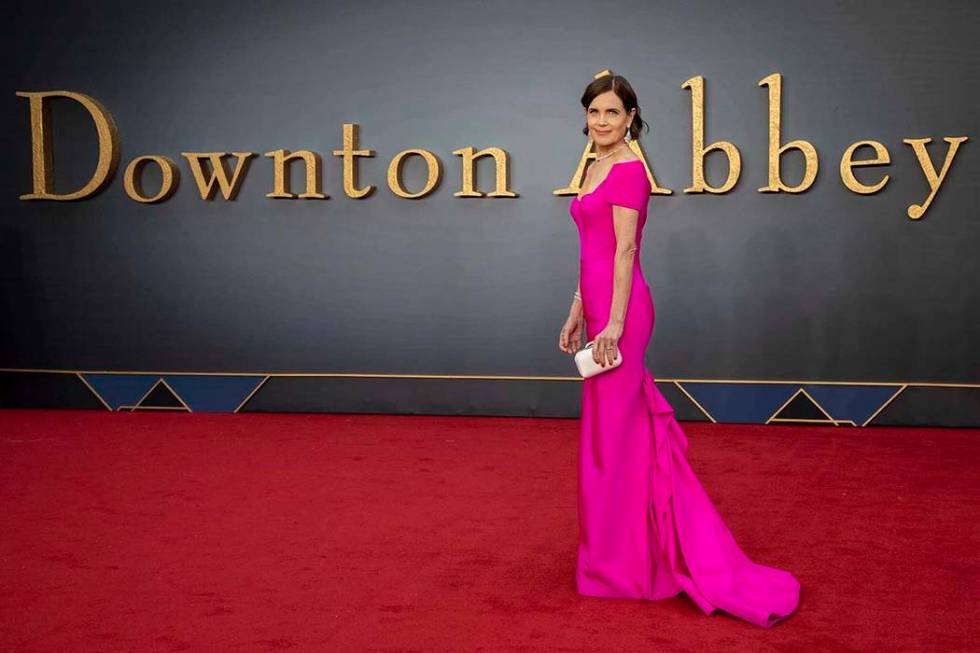‘Downton Abbey’ actress Elizabeth McGovern slips back into role

The Countess of Grantham would like to cordially invite you into her closet. It’s not filled with elaborately beaded period gowns. Elizabeth McGovern, who lives in London with her film director husband, Simon Curtis, is like any other working mum.
Yes, she digs a good pair of skinny jeans. “I love stepping back into the past as an actor, but I’d be just as happy to burn my corsets,” she joked. “In my own life, I’m reaching for a pair of trousers.”
That isn’t happening — at least not on screen this fall — when the 58-year-old Illinois native who began her film career in Robert Redford’s Oscar-winning “Ordinary People” and was a best supporting Oscar nominee for Milos Forman’s “Ragtime,” returns to familiar and elegant grounds.
Get ready to brew some tea and lift a pinkie finger when “Downton Abbey” comes to the multiplexes Friday, Sept. 20. The new film is the continuing story of the Crawley family, the wealthy owners of a large estate in the English countryside in the early 20th century.
Review Journal: What is a great Sunday for you in London?
Elizabeth McGovern: I love living in Chiswick (in west London). I’m so grateful that life took me there because it’s where I was meant to be. So, when I’m home, a wonderful Sunday is just spending time with my husband (Curtis directed “My Week With Marilyn”) and our daughters, if they have time. Maybe we’ll take a walk. Go out for some good coffee and read the paper. Or we’ll take the Tube to one of the museums.
Are you excited that “Downton Abbey” will fill the big screen?
It’s lovely. It’s exciting for everyone. This film meant the entire cast was able to see each other and spend real time together. That was such a joy. Also, it’s amazing to hear how excited people are to see the film.
What can you tell us about the plot?
It’s set not too far from where we left off after the series ended in 2016. The King and Queen of England visit, which throws the household into a tizzy. There is tension between the royal staff and our staff. I can’t really say much more beyond that because I don’t want to ruin it.
How tough was it to slip back into the mindset of Cora Crawley, Countess of Grantham?
In a way, it felt like we never left. It was like a new day had dawned and no time had passed. What helped was seeing all of my fellow actors. Plus, in the years since the TV series filmed, I can tell you that the house hasn’t changed very much. I was surprised to see that not too many blades of grass had even shifted.
What was the best part of the “Downton” experience?
There is something extraordinary that happened on that job. It was the pleasure of working with a group of artists over a course of time. Doing films, you rarely see the same person twice. But to be on the set of “Downton” for all those years, I formed real relationships. There is a trust. These people are my family.
What drew you to the character?
She was the fish out of water. She was part of the nouveau riche America. Her father was a self-made man. When she married Robert, I believe she did have feelings of being in love with him, even in the beginning. The deal came first for Robert, who did what was necessary to save the estate.
But they do love each other.
He married her for her money. What’s nice about their marriage is that it became a happy and loving one for both of them.
What was your toughest moment to film on the series? And most thrilling?
When Cora loses her daughter, it was heartbreaking. It was deeply painful for me. Most thrilling? I love the relationship Cora has with her mother-in-law (played by Dame Maggie Smith). It’s a good thing Cora is steely because there were early days when she felt like she was a disappointment to her mother-in-law. I think of them now as friends and allies.
Do you remember your last dialogue from the series?
One of my last lines, which I loved, is when Cora told her husband what she wants for the future. Cora says, “A long and happy life together where we two watch the children grow is all I want.” Simple and beautiful.
You grew up in Evanston, Illinois, where your mom was a high school teacher and your father was a law professor at Northwestern University. What did they make of you wanting to act?
I still think my family is a bit mystified by my love of acting!
What do you remember from making your movie debut in Robert Redford’s “Ordinary People”?
It feels like such a dream. I was so young and inexperienced, but I was in the hands of a director who was so intelligent and an absolutely marvelous man. Robert Redford also informed the set with a gentleness and kindness. I thought all of the business would be like that experience.
You recently produced “The Chaperone,” a film set in the 1920s, about a woman over 50 who accompanies a 15-year-old future icon, Louise Brooks, to New York City. Why is it important to tell stories about women who have earned some decades?
I do like stories about an awakening, which can happen at any age. I feel like I’ve had one in my 50s. I’m still learning and making discoveries about myself. It’s nice for people to see those stories because Hollywood doesn’t represent women in their 50s as much in movies or TV. You can build your faith in yourself at any age.